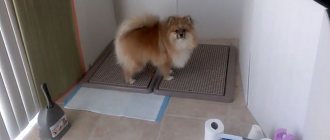Despite their miniature size and outward harmlessness, Pomeranians can show aggression, which they express in the form of annoying barking. They bark with or without reason, at their own people and at strangers, out of joy and sadness. At first, this circumstance is amusing, but later the barking of the Pomeranian Spitz becomes boring and begins to irritate the owners, neighbors and passers-by on the street. In order for a dog to become “controllable” and not bark constantly, you need to know why it grows so noisy and how to wean it from a bad habit.
Does a Pomeranian bark a lot and often?
Dogs barking is their way of communicating with humans and other animals on a verbal level. Behind the familiar sound is information that pets try to convey to humans. It is for this reason that domestic animals bark much more often than wild animals.
Dogs make sounds of different ranges and timbres. A roar, a squeal, a howl escapes from the mouth. Any intonation is accompanied by movement of the ears and tail. By carefully observing your pets, it is easy to guess what they want.
The Pomeranian's bark can be rough, shrill and vary in timbre. After listening, the owner understands what happened to him:
- Frightened - the tail is tucked, and the barking turns into a random squeal.
- The dog is cold or bored - a quiet howl.
- Aggression - barks rudely and abruptly.
- Danger - short loud sounds, gradually turning into a growl.
- The desire to play is joyful barking, squealing and yapping, similar to that of a puppy.
The Pomeranian Spitz is very active and vocal, reacts to any sound, even from the next apartment. He sleeps lightly, the baby jumps up and barks at any rustle.
At home
If your Spitz reacts violently to every rustle behind the wall, tries to attract attention, or is simply fooling around, you need to pull him back. They touch the dog sharply, make a restrictive sign with their hand, splash water in the face, hiss - and at the first yelp, until the pet is very excited. An excellent solution is to teach the “Quiet” command. It is better not to use the commands “Fu”, “No”, as they are intended for other situations.
When the pet has calmed down, its attention is switched to a toy or treat.
But if the dog is drowning in another room, you cannot run to him - this is how the owner indulges his whims. It’s better to call him to you, wait until the pet starts barking again and pull him back.
Reasons why your Pomeranian barks
How talkative a dog is depends on a number of factors - breed, heredity, size. Pomeranians are small dogs, and they (unlike large ones) constantly bark loudly and loudly.
The dog needs frequent communication with its owner. He barks incessantly, asking his owner for as much attention as possible.
Another reason is the loneliness that a pet faces when it is locked in an apartment all day. The Spitz communicates its boredom and desire to do something with a loud bark.
The third reason is the special character of the breed. They need affection, love, understanding, so German Spitz barks ask to be stroked, scratched and caressed.
Despite their miniature size, dogs have a guard instinct, so they use their voice to report approaching danger.
Another reason for loud barking is the pleasure of playing. If a dog stops when ordered and stops barking, this is normal. More often than not, the Pomeranian does not calm down right away and you need to show some character to keep him quiet.
The right team is your secret weapon
How to stop a Spitz from barking
using commands? Dogs of this breed are highly trainable. We teach the dog to lie down, sit, come to me - we command every time the Spitz breaks into barking. There is no reaction - you “reprimand” in a calm voice. In addition to commands, try using the following methods of influence:
- We use hissing sounds - your pet instantly reacts to them and calms down.
- We touch the Spitz's ears, lightly squeeze them or simply stroke them - the dog stops barking, calms down and develops a strong reflex not to utter sounds during such manipulation.
- Walk your dog for at least 1.5 hours - excellent physical activity will relax your Spitz and release unnecessary aggression.
How to stop a Pomeranian from barking: useful tips
Many dog breeders make mistakes when raising a puppy - they praise for barking. After some time, his “talkativeness” begins to cause inconvenience. To stop your Pomeranian from barking frequently, do not encourage this behavior in any situation. Use long-term methods:
- when communicating with a pet, they avoid screaming, using it only as a last resort;
- education and training are involved from a very early age;
- use natural food supplements to neutralize aggression (with valerian, chamomile).
You can resort to quick methods:
- tactile - do not stroke, do not show tenderness to the orange, but lean towards it and fixate it so that it understands that the barking needs to stop;
- sound - make hissing sounds towards the dog;
- long walks - they help reduce aggressiveness and noisy behavior.
The optimal option is chosen depending on the specific situation and the place where the annoying noise from the Spitz occurred.
On the street
During walks, a Pomeranian may perceive surrounding people as aggression and begin to bark at passers-by. This behavior is explained by too rare and short walks. To discourage barking on the street, follow a number of recommendations. They take with them a treat that is especially desirable for the pet, but is rarely used. The dog must know that it is in the owner’s pocket, because sometimes they let him smell it. The Spitz is distracted from passers-by and waits for the desired treat.
It is necessary to teach your Pomeranian the “Sit!” command. It is said every time people pass by.
A tin of coins can help attract your dog's attention. They take it for walks and use it when the little Spitz's voice begins to cause inconvenience to others.
One of the drastic methods of getting rid of barking is the use of a muzzle. Some offer something even more radical – an electric collar. The method is cruel, but effective, it is used only when others have already been tried and did not help. The action is based on micro-shocks of electric current in response to vibrations of the vocal cords.
At home
In most cases, the dog barks at home if he gets little attention. You can correct the situation as follows:
- pat him on the back after he calms down;
- arrange a comfortable place for him to rest;
- buy toys;
- walk at least twice a day.
Experienced dog handlers advise using several practical techniques if you cannot “calm down” the Pomeranian Spitz.
- Distract with a treat when there is noise outside the door.
- Teach the command “Quiet!”
- Repeat the exercise several times - ask someone to ring the doorbell and throw a treat on the floor so that the dog takes the call calmly.
- Demonstrate an indifferent attitude towards the pet when it barks (turn away from it, crossing your arms over your chest). Give praise and treats when he stops barking.
- Constantly control the greeting bark, teaching it to sit quietly until the owner approaches.
When the owners are not at home
Most Pomeranians start barking as soon as the door closes behind their owner, in an attempt to win him back. Several techniques can help you avoid this. Even during the training period, the dog owner should not contact the dog, talk or “say goodbye”. The Pomeranian is seated at a distance, and when he tries to get closer, he is pulled back and returned to his original place.
With the help of actions, you can explain to the dog what behavior is undesirable. To do this, they leave the apartment and return the moment she stops barking. Gradually, the time of absence is increased, reinforcing the skill with encouragement.
You can train to behave quietly on command. First they give the order “Voice!”, then “Quiet!” and do not allow barking, holding the mouth and giving a treat. As soon as the dog understands what they want from him and begins to follow the command, he is treated and praised.
The owner's return home
Dogs are always waiting for their owner. They greet you at the door because they have perfect hearing and can distinguish footsteps from many others. Because of their excellent sense of time, pets accurately determine when a person returns home. From overwhelming feelings, the small dog begins to bark loudly and continuously, jump on the owner’s chest, and get underfoot. This behavior is corrected using the commands “Place!”, “Sit!”. When meeting a Pomeranian, you should not talk or communicate too emotionally, so as not to trigger a similar response. It is not forbidden to silently take the baby in your arms and stroke it.
Barking at guests
When guests come to the house, the Pomeranian Spitz often behaves not very friendly - barks at them, growls. He perceives strangers as violators of the boundaries of the home space that is under his protection. In his opinion, guests are intruders who threaten family members. The animal experiences stress, its protective instinct turns on, so the dog becomes wary after the doorbell rings.
For such Pomeranians, you need to keep your favorite toy ready and teach them to pick it up on command after a guest appears in the house. The mouth will be busy and the dog will physically not be able to bark.
The Spitz must be trained in the commands “Sit!”, “Wait!”, “Quiet!”, which are pronounced when guests enter the house.
To loud noises and other irritants
Pomeranians show anxiety and react sensitively to various noises: the sound of a working elevator, a car, an opening door in the entrance and a meowing cat outside the window. The dog begins to bark out of anxiety or fear of the unknown. She can get used to the sounds if she records the “collection” on a voice recorder and plays it back, observing the Pomeranian’s reaction. At the same time, the command “Lie down!” is given. and are treated to a treat. Gradually the dog gets used to it, they train it, further increasing the volume until they achieve a calm reaction to various noises. The training takes several weeks, after which it is repeated if new sounds appear that bother the pet.
Types of training
By nature, Spitz dogs are obedient and smart dogs that are easy to train and accustom to different commands. Training a Spitz at home is an important point in raising an intelligent and obedient dog.
There are different options for how to train a puppy, so even if you have problems with having free time for training, do not leave the situation to chance. Choose one of the training options:
Dog training
- individual lessons with a dog handler;
- joint training with a trainer;
- independent exercises with a Spitz.
Lessons with a dog handler
These lessons are conducted by experienced dog handlers directly in private with your pet. Such training will help you avoid mistakes when raising an adult, obedient dog, but it is better to start them from an early age. Upon completion of training, you will receive a well-mannered trained Pomeranian.
The dog trainer will not only teach the puppy a course of basic commands - “Voice!”, “Lie down!”, “Place!”, “Sit!”, “Face!”, “Paw!”, but will also prepare the future winner of exhibitions.
Naturally, there are disadvantages to such training:
- high cost of canine services;
- long separation from your pet;
- subsequent adaptation.
Joint training
To raise a Spitz that will not only be obedient, but also easily make contact with you, joint training with a dog handler will help.
This option is the most reliable. It will allow you to get the most useful information on raising a pet and an excellent result upon completion of training.
The principle of this training is that you and your dog take courses at a canine center under the supervision and guidance of specialists. At the same time, the pet gains experience communicating with other dogs, learns how to dominate and bite, but does not separate from you.
Independent studies
If you don’t have extra money for a dog handler, don’t want to be separated from your pet, or don’t have the opportunity to work with a trainer, the option of self-training is perfect.
However, keep in mind that despite the fact that Spitz teams are quite easy to remember, this option requires a long study of specialized literature and complete dedication from you.
But this method is compensated by a strong mutual connection with the pet, obtained during classes and the educational process.
Features of training
When training a Pomeranian puppy, you need to follow these guidelines:
- Training should be consistent: first teach the pet simple commands, and then move on to more complex ones.
- At the beginning of training, each team should be supported by a nickname.
- When training, you need to act gently but persistently. You should not yell at your puppy or punish him too much. But at the same time, one should not allow commands to be ignored or executed incorrectly.
- Almost all commands should be given in a calm voice without a threatening intonation. The only exceptions to this rule are the prohibiting commands - “Fu” and “No”.
- You should not distort the names of the commands, for example, replace the command “Lie down” with “Lie down” or “Lie down”. This can confuse the dog and cause it to refuse to follow the owner's orders.
A Pomeranian should never be allowed to carry out commands given by strangers. This will help prevent the dog from being kidnapped and will reduce the risk of strangers harming it.
Options for stopping barking while you're away
- You must get all the energy out of your Pomeranian through active play and entertainment. Then be sure that the tailed one will fall asleep soundly and will not disturb the peace of the neighbors.
- You can resort to drug treatment. You just need to consult a veterinarian, and he will prescribe you mild sedatives. However, do not forget that this is a temporary way to eliminate barking and it is not recommended to resort to it constantly.
- Various dietary supplements are also a possible option to calm your Spitz.
- Use aromatherapy treatment using a special herbal collar.
- Ultrasound to stop barking. This modern development is built into the collar, and as soon as the dog begins to bark, he hears a sound that is unpleasant for his ears, as soon as he becomes silent, and the torture ends. A fairly effective method to wean off barking, if your puppy does not start barking from this sound.
- Collar with built-in spray. What modern developers haven’t come up with! This new product also gives good results. Its action is as follows: as soon as the puppy begins to bark, the sensor is triggered and the collar releases a stream with an unpleasant citrus aroma for the pet. This way, your puppy, having grasped the relationship, will learn to behave quietly, and you can wean him from barking for no reason.
- Shock collar - The dog receives a small shock as soon as it starts barking. The method is not entirely humane and is suitable if previous methods did not produce an effect.
- Leave music for the puppy when you are not in the apartment, i.e. turn on the radio so that your pet does not get bored.
- Close the curtains before leaving so that passers-by do not irritate the dog again, and it does not go into a fit of barking at strangers.
- Leave your pet plenty of toys so he has something to do. In this way, you can wean him off barking if he barks out of boredom.
Encourage your pet for correct behavior, so he will understand what he can do and what is unacceptable. After all, dogs are by nature very intelligent creatures. Show just a little patience and your dog will learn appropriate behavior and will only please you.
So, you've learned about effective methods for stopping your dog's barking, received general recommendations, and now you'll be fully prepared when you hear loud noises from your pet.
You can calm him down in a matter of minutes without disturbing the peace of your neighbors. The main thing is to remember that only regular training will make your pet an obedient, smart and calm dog!
By following the recommendations, you can help your friends and acquaintances if they suffer from a similar problem and cannot stop their dog from barking loudly for no reason.
Proper care
The weak point of Spitz dogs is their teeth. You will avoid periodontal disease if you follow your diet, brush your teeth and use a special toothpaste.
The peculiarity of these dogs is their odorless coat, but it must be carefully looked after. Brush your pet 1-2 times a week with a long-toothed brush (without massage balls). Before doing this, moisten the wool with spray or water with the addition of conditioner (1:2). Unravel the tangles first, then comb them out.
The German Spitz cannot be clipped, otherwise the quality of the coat will deteriorate. The result of such care is that the fur looks like cotton wool. The coat loses its dirt-protective properties and looks sloppy even after washing. If you do not have independent grooming experience, use the services of a professional groomer.
Bathe your pet no more than once a month. Frequent washing washes away the protective fat film, and the guard hair becomes brittle and dull. After bathing, the dog should be dried with a hairdryer while combing it (do not dry it with a towel!).
Mistakes of owners in education
Owners should carefully study the habits of their pet, determine what causes anxiety, joy, fear, and only then move on to specific actions and training. Each animal is individual, has its own disposition, temperament, character. Even within the same litter, dogs will have different psyches and a certain threshold of nervous excitability.
If a dog has been expressing any emotions by barking since puppyhood, for example, when greeting you at home, you should not praise him or encourage him to bark. This will provoke the development of an incorrect reflex. The dog feels praise and thinks that with this behavior it brings joy to its owner.
Do not allow your dog to chase birds or cats. Stop if your pet shows increased interest in passers-by. The dog should be neutral towards strangers. Barking at passersby for no reason is unacceptable. Do not allow strangers to provoke your dog. In this case, the dog will stop trusting the person and will bark at everyone for any reason.
Try to avoid situations that provoke your dog to bark. Constantly monitor your behavior and environment. Immediately stop wrong actions, eradicate the bad habits of your ward.
Act firmly, persistently and consistently. Reinforce correct behavioral skills through systematic training. Even if you missed a step in raising or adopted an adult dog from a shelter, you need to understand that training and weaning from bad habits will take more time. Contact a dog handler for help and take a general training course.
Methods for correcting behavior
Before starting corrective work, it is advisable to identify the reasons for the ward’s excessive emotionality. If the dog barks for absolutely no reason, while eating, immediately after waking up, at night, you should contact a veterinarian and examine the tailed dog for inflammation, painful areas, and neurological disorders.
Don't encourage barking - common mistakes owners make
You can fight for years for silence in your home and be the cause of your pet's barking at the same time, without even realizing it. Absolutely all dogs have an innate instinct of human orientation, that is, if the owner encouraged an action in any way, it means that the four-legged dog behaved correctly.











